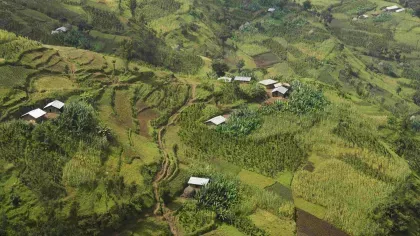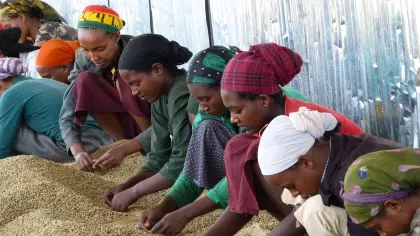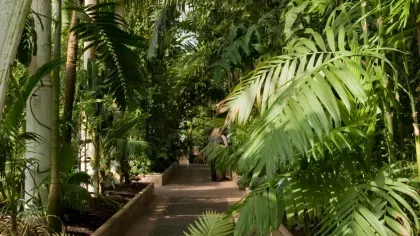30 January 2017
Kew at the UN Biodiversity Conference
China Williams, from Kew’s Conservation Policy team, discusses updates from the UN Biodiversity Conference that took place in December 2016 in Cancun, Mexico.

Introduction to CBD
Last month, a small team from Kew travelled to Cancun in Mexico, to take part in the ‘UN Biodiversity Conference’ – a joint meeting of Parties to the Convention on Biological Diversity (CBD) and its two Protocols – the Cartagena Protocol on Biosafety, and the Nagoya Protocol on Access to Genetic Resources.
The Kew team joined over 7,000 participants, made up of delegates and Ministers from around 167 UN countries, along with representatives from industry, business, academic institutions, NGOs and indigenous people’s groups – to discuss and make key decisions for the global community to tackle biodiversity loss.
With representatives from many of our partner institutions, the Kew team had an excellent opportunity to engage with key stakeholders, promote Kew’s work, and, crucially, ensure that cutting edge scientific research is at the heart of decision making at this level.
Kew’s role at the Biodiversity Conference
I attended as part of the UK Government delegation made up of representatives from Defra, the Welsh government, Joint Nature Conservation Committee (JNCC) and the Natural History Museum (NHM). The Bermudan Environment Minister, Cole Simons and the Deputy Premier of BVI, The Honorable Dr. Kedrick D. Pickering also participated in the meetings.
The UK worked with other EU Member States to cover and comment on all agenda items and discussions. Kew’s role was focused on covering agenda items relating to capacity building, and in particular items relating to the Nagoya Protocol.
Kew’s global collaborations
The conference also provided an excellent opportunity to meet with official government delegates from many of the countries where Kew has, or is developing, partnerships.
I met with the Madagascan Access and Benefit Sharing (ABS) Focal Point, Professor Gemedo Dalle formally of the Ethiopian Biodiversity Institute, and now the Ethiopian Environment Minister, and colleagues from Kenya, Japan, China and Indonesia, to name just a few. This gave me a chance to discuss agreements, find out about new developments in national legislation or permitting requirements and keep up to date with changes in personnel and partnership needs.
Kew representatives also joined a meeting of the Consortium of Scientific Partners to discuss how the international scientific research community could do more to support the Secretariat and Parties with the implementation of the ‘Aichi Targets’ – the 20 goals to support positive action for biodiversity by 2020. As a member of the Consortium of Scientific Partners, Kew provided input into how it is contributing towards the Aichi Targets.
Professor Kathy Willis, Kew’s Director of Science spoke on a panel about biodiversity mainstreaming in the agricultural sector, in the first ever Business and Biodiversity Forum which preceded the Conference. At another event, supported by Kew’s Foundation and Press Office, Prof. Willis signed a collaboration agreement with the Mexican Foundation for the Conservation of Nature.
David Cope and Sarah Roberts from Kew’s External Affairs, alongside Julia Willison from Learning & Participation hosted a side event at the Communication, Education and Public Awareness (CEPA) Fair. This fostered a lively discussion with representatives from several other botanic gardens about the wider role they play in communicating, educating and raising public awareness of biodiversity.
Biodiversity Conference outcomes
The headline outcome was the Cancun Declaration, firmly highlighting the conference theme of ‘mainstreaming the conservation and sustainable use of biodiversity for wellbeing’. This represents a significant shift of focus away from decisions on pure biodiversity protection, which have had limited public support and success, and moving towards decisions that put human wellbeing at the heart of biodiversity protection strategies. With the 2020 deadlines fast approaching, Parties are being urged to focus on developing a strategic plan that aligns with the broader set of UN ‘Global Goals’ on Sustainable Development. Kew is well placed to work towards this critical challenge, and to provide advice across sectors ensuring a true understanding of the key role biodiversity plays in human survival.
The full list of decisions can be seen in the 'find out more' section below, but some key topics for Kew are:
Protected Areas: Many Parties made commitments to accelerate efforts to achieve the Aichi Targets, particularly with regard to establishing protected areas. This topic was given particular weight by the fact that the meetings were opened and presided over by Mexico’s Minister of Environment and Natural Resources (SEMARNAT).
Digital Sequence Data: Strong views are held by Parties on the issue of how digital sequence data should be dealt with. Some Parties wish to treat utilisation of sequence data (and benefit sharing obligations) in the same way as genetic resources. Others are more cautious as to the implications of such a decision, particularly for researchers. A decision was taken to establish a two year process, a technical expert group to provide recommendations in time for the next COP, and a survey. At Kew we have already seen that some of our partners’ national legislation and permitting terms are being extended to cover digital data, and so we will need to be involved in these discussions to help develop some practical solutions.
Capacity Building: While all Parties recognised the very real need for capacity building to support implementation, particularly in developing countries, Parties had differing views on how this should be achieved. The COP finally adopted a voluntarily funded short term action plan for capacity building up to 2020.
The next meetings of the Biodiversity Convention will be in Egypt (2018) and China (2020), where Kew is planning a significant presence. Until then, as the first line of the Cancun declaration states:
‘It is essential to live in harmony with nature and mother earth as a fundamental condition for the well-being of all life, which depends on the conservation and sustainable use of biodiversity’.



